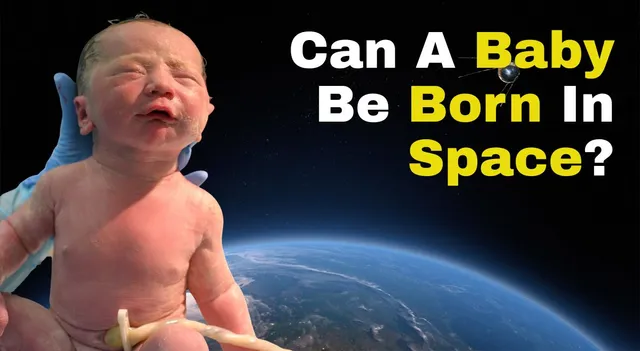- By Ridam Sharma
- Wed, 30 Jul 2025 05:39 PM (IST)
- Source:JND
Baby Born In Space: Do you think it is theoretically possible for a baby to be born in space? Science says childbirth in space in space can lead to a very high-risk and complicated situation. Physically, conception could be possible in a microgravity environment, but all aspects of human reproduction, like pregnancy, delivery, and infant growth, are subject to major challenges beyond anything on Earth. Let’s take a closer look at the science, risks, and potential future of space pregnancy and childbirth in space, according to Science Alert research by Arun Vivian Holden.
Microgravity Is A Problem:
As you may be aware, microgravity affects the body in so many different ways. Especially in pregnancy, it can interfere with the body's ability to support the fetus, as the fluid and baby would both float, making not only gestation but also the process of giving birth tremendously complicated. Additionally, giving birth in zero gravity can also lead to logistical issues like positioning the mother, medical equipment, and the newborn baby. Also, it is important to note that the body fluids do not act like they do under gravity, which can make the process of childbirth unpredictable and dangerous in space.
Also Read: What Can Astronauts Eat And Cannot Eat In Space?
Exposure To Excessive Radiation:
Another significant issue in childbirth in space is exposure to excessive radiation. Earth's magnetic field and atmosphere protect us from high-energy cosmic radiation. However, in space, both mother and baby would be subject to excessive radiation that can harm DNA and interfere with the cellular development of the baby. Especially in the initial stages of pregnancy, which can increase the risk of miscarriage, abnormalities in the newborn baby, and even initiate premature labour. Even after delivery, the baby born in space is not safe, as the brain and body of a newborn can remain very vulnerable to radiation, which can also lead to cognitive or physical disabilities.
Child Development Is A Challenge:
Numerous problems can make childbirth and pregnancy in space very brutal. Child development in microgravity can also be proven problematic in space. For example, newborn babies are dependent on gravity signals for taking baby steps in the initial growing phase, like head lifting, sitting, and walking. However, in the absence of gravity, baby-steps like these may be delayed or modified, which might negatively affect the posture, coordination, and neuromuscular development in the child born in space.
Also Read: GK Quiz Questions On Axiom-4 With Answers
Therefore, a baby being born in space is not theoretically impossible, but with significant, life-threatening challenges like microgravity, excessive radiation, and much-needed medical care. In short, it is a long way to go. It will take more research and better technology before human birth in space becomes a possibility. However, in a digital era, a technologically oriented world, a baby being born in space is not a possibility.

